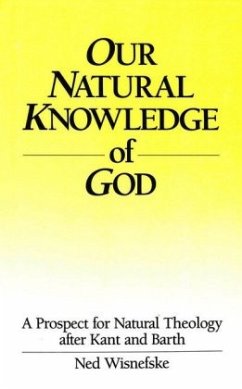Natural theology, the claim that we come to know God through the natural world, has persisted in the common understanding in spite of the fact that modern philosophy - and even theology - rejected it. The author argues that the reason for this is that natural theology was taken to rest on abstract proof or subtle religious feelings, when actually it stems from more ordinary experiences and practices common in our natural life. He shows that even Kant and Barth, the leading philosophical and theological opponents to natural theology, opened the door for a more pragmatic appraisal of natural theology in their late work. The author then shows how the common conviction that our natural life testifies to the reality of God arises inevitably and for good reason from natural practices, propensities, and the dispositions stemming from them. The pragmatic natural theology which results is one neither Kant nor Barth need object to, for it neither illegitimately extends our scientific knowledge of nature nor presumptuously legitimates christian theology.
"The continuation and enrichment of the enterprise of natural theology is of overriding importance today. Natural theology not only might well enlarge if not establish our knowledge of God; just as important, it may enlarge as well our understanding of nature. By articulating those experiences of nature which can be taken as 'signs' of God, natural theology at the same time expands out 'knowledge' of natural reality beyond the objectifying reduction of nature effected by natural science - a reduction that invariably has led to exploitation of nature. Wisnefske's book thus helps excellently to prepare us not only for a new and firmer knowledge of God, but also for new attitudes toward nature and for a deeper respect for nature as herself an image of God." (Langdon Gilkey)
"I would very strongly recommend this book to anyone interested in natural theology as pursued within the idiom of the contemporary though not analytic approach. Besides the merit of bringing a fresh perspective to the authors it surveys and to the later history of the subject, it stakes out an important and possibly very rich claim. It is an important contribution to current philosophical discussions in theology." (Jay Reuscher, Theological Studies)
"Wisnefske's approach is a stimulating one. It should be of special interest to those who have an anti-metaphysical bent but who, in this day of profound ecological concern and dissatisfaction with a scientific analysis of nature unconnected to value, are interested in connecting acknowledgement of God with the patterns of natural life. ... Wisnefske's style is lucid, even winsomely poetic and aphoristic - a refreshing alternative to the 'academese' of too many books in philosophical theology." (Donald G. Luck, Word & World)
"A lo largo de este estudio, que será indispensable y fundamental en la bibliografía española de fenomenología y hermenéutica, es de alabar que se citen ampliamente los textos de Gadamer, del que aún es poco traducido en nuestra lengua. ...El buen sabor de boca que nos deja este estudio proviene, dicho en lenguaje de Gadamer, de una "fusion de horizontes" con el investigador y el autor estudiado." (Juan Masiá Clavel, Pensamiento)
"I would very strongly recommend this book to anyone interested in natural theology as pursued within the idiom of the contemporary though not analytic approach. Besides the merit of bringing a fresh perspective to the authors it surveys and to the later history of the subject, it stakes out an important and possibly very rich claim. It is an important contribution to current philosophical discussions in theology." (Jay Reuscher, Theological Studies)
"Wisnefske's approach is a stimulating one. It should be of special interest to those who have an anti-metaphysical bent but who, in this day of profound ecological concern and dissatisfaction with a scientific analysis of nature unconnected to value, are interested in connecting acknowledgement of God with the patterns of natural life. ... Wisnefske's style is lucid, even winsomely poetic and aphoristic - a refreshing alternative to the 'academese' of too many books in philosophical theology." (Donald G. Luck, Word & World)
"A lo largo de este estudio, que será indispensable y fundamental en la bibliografía española de fenomenología y hermenéutica, es de alabar que se citen ampliamente los textos de Gadamer, del que aún es poco traducido en nuestra lengua. ...El buen sabor de boca que nos deja este estudio proviene, dicho en lenguaje de Gadamer, de una "fusion de horizontes" con el investigador y el autor estudiado." (Juan Masiá Clavel, Pensamiento)

